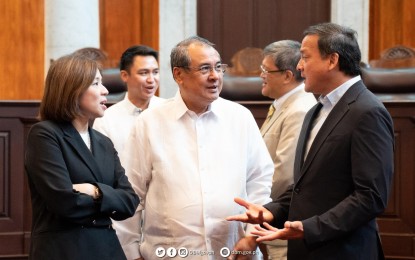
OPEN JUSTICE. Budget Secretary Amenah Pangandaman (left) and Supreme Court (SC) Chief Justice Alexander Gesmundo (center) meet at the SC office in Manila on Wednesday (May 31, 2023). They discussed efforts to pursue an "open justice" policy. (Photo courtesy of DBM)
MANILA – The Department of Budget and Management (DBM) will be working with the Supreme Court (SC) to carry out the plan of pursuing an “open justice” policy.
This developed after SC Chief Justice Alexander Gesmundo, in a meeting with DBM Secretary Amenah Pangandaman on Wednesday, expressed full support for the Philippine Open Government Partnership (PH-OGP).
“We are independent of each other, but we must work together," Gesmundo, as quoted by the DBM, told Pangandaman who currently serves as chairperson and secretariat of the PH-OGP steering committee.
Pangandaman assured the judiciary of the DBM's full support for its open justice efforts.
The DBM said the partnership with the judiciary is part of the whole-of-government approach in promoting open governance in the country.
It said the SC’s Strategic Plan for Judicial Innovations (SPJI) 2022-2027, which serves as its blueprint of action to deliver greater access to justice, will be aligned with the OP-PGH’s 6th National Action Plan.
“For the first time, the PH-OGP and the Judiciary will align the outcomes of the SPJI 2022-2027 with the 6th National Action Plan for the overall realization of opening justice – one of the key OGP policy areas for reform,” the DBM said.
In 2011, the OGP was formed to promote transparent, participatory, inclusive, and accountable governance.
The Philippines is a co-founding member of the OGP, a multilateral organization of reformers from government, civil society networks, businesses, and non-profits reflective of the values of access to information, public accountability, citizen participation, and leveraging technology and innovation to strengthen governance.
According to the OGP’s report, open justice applies the principles of open government, such as transparency, civic participation, and public accountability to the justice system.
The OGP said transparency, civic participation, and public accountability are vital in ensuring a fair and effective justice system.
Data privacy
Meanwhile, the DBM signed the DBM Data Privacy Manual and Data Privacy Commitment Statement on the first day of its two-day learning sessions conducted in line with the celebration of the annual National Data Privacy Awareness Week.
The two documents were inked Tuesday by Pangandaman and Undersecretary Maria Francesca del Rosario who serves as the Functional Group Head of the DBM’s Information and Communications Technology Group.
Under the Data Privacy Commitment, the DBM is mandated to maintain transparency and openness and ensure prompt response to inquiries or complaints related to personal data protection.
The DBM is also directed to inform its client government agencies, employees, and partners of their rights and provide a means to exercise them effectively.
It is also tasked to continue the evaluation and improvement of data privacy strategies to ensure the effective delivery of the agency’s commitments, in compliance with applicable laws, regulations, and standards.
The DBM conducted the two-day learning sessions from May 30 to 31 to promote awareness of data privacy and cybersecurity.
“We’re not just managing the cybersecurity or security of financial information, we also have the personal information of all government employees nationwide. That’s how important these sessions are,” del Rosario said.
Republic Act (RA) 10173 or the Data Privacy Act of 2012 declares as a state policy the protection of the fundamental human right of privacy of communication while ensuring the free flow of information to promote innovation and growth.
Under RA 10173, the state recognizes the vital role of information and communications technology in nation-building and its inherent obligation to ensure that personal information in information and communications systems in the government and the private sector are secured and protected. (PNA)
